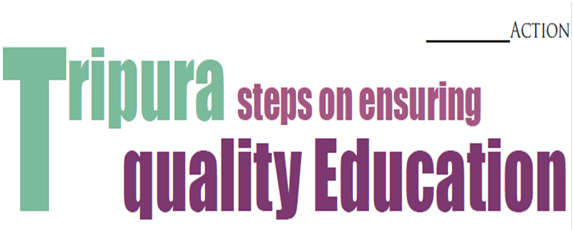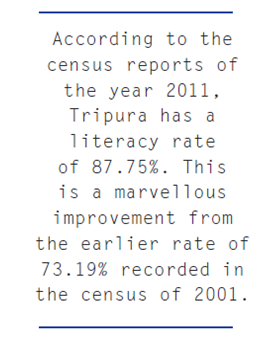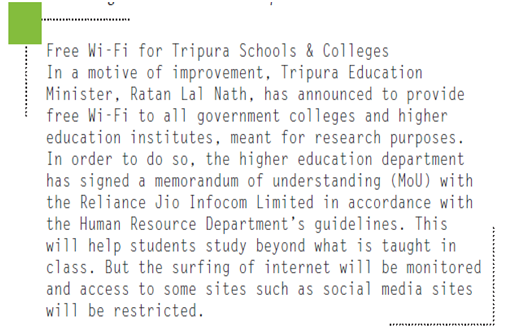
While decided to implement National Council of Educational Research and Training (NCERT) syllabus letter and spirit including the school times, Tripura government malls an idea to close down about a hundred schools from next academic session. The proposal was mooted after the government received the feedback that in some interior locations, schools have been running with equal number of students and teachers but having a huge infrastructure, maximum parts of those were left unused over the years. Tripura built more than 5000 school buildings and number of schools has become double in last 10 years that increased the demand for teachers and other staffs. Over the year, Education Department of Tripura has appeared to be the biggest sector of government employment in past decade. Though there was specific eligibility criteria laid down for recruitment of teachers in the Right of Children to Free and Compulsory Education Act, 2009, Tripura government did not follow it till 2012. There was a horizontal expansion of education in Tripura not by improving quality but in terms of infrastructure, buildings, recruitment of teaching staffs and recapitulating the strategy to narrow down, drop outs at school level.
mooted after the government received the feedback that in some interior locations, schools have been running with equal number of students and teachers but having a huge infrastructure, maximum parts of those were left unused over the years. Tripura built more than 5000 school buildings and number of schools has become double in last 10 years that increased the demand for teachers and other staffs. Over the year, Education Department of Tripura has appeared to be the biggest sector of government employment in past decade. Though there was specific eligibility criteria laid down for recruitment of teachers in the Right of Children to Free and Compulsory Education Act, 2009, Tripura government did not follow it till 2012. There was a horizontal expansion of education in Tripura not by improving quality but in terms of infrastructure, buildings, recruitment of teaching staffs and recapitulating the strategy to narrow down, drop outs at school level.
Women Education has been highly promoted in Tripura, since royal regime and after attaining statehood in 1972; the elected governments have introduced several programs to encourage more and more women in the society to be enrol in schools and colleges. According to the census reports of the year 2011, Tripura has a literacy rate of 87.75%. This is a marvellous improvement from the earlier rate of 73.19% recorded in the census of 2001. The government of Tripura aids the poverty stricken children to learn by providing free education to all children between the ages of 6 to 14 years old. Besides, promotion of education in major languages likes Bengali and English, Tripura government under the edge of State Council of Educational Research and Training (SCERT) has begun Development of Tribal and Minority Languages of Tripura. For this purpose Advisory Committees for Development of Kokborok, Chakma, Halamkuki, Mog, Bishnupriya Manipuri and Manipuri languages have been constituted. Kokborok (main dialect of indigenous community) has been recognised as official language with Bengali in 1979 but unfortunately, today neither Bengali nor Kokborok is used in official communication rather English overruled it at official level. Though in teaching – learning process, English is still far behind in school and college level. Apart from that the Bishnupriya Manipuri Language is being taught as a subject in schools of Tripura from classes I to V while text book in Chakma, Halam and Kuki languages have been prepared and ready for publication.
 After 25 –yrs of uninterrupted communist rule in Tripura, when BJP-IPFT government came in power, about 10 months ago, first realized the sentiment of both tribal and non-tribal and also the poor status of English language in the education system. Following party line and influence of main land India, BJP led government has attached importance to Hindi along with English besides, Bengali and Kokborok. The major shifting of trend finds its place when the school level curriculum adopted as it is of NCERT and the government announced to convert at least one school in each district as English medium from next session. Lack of proper training of the teachers and recruitment of teaching staff without maintaining the quality as well as flouting the criteria set out under law in the schools and colleges, quality education has reduced below the margin. The state has been producing more than 10,000 Madhyamik and Higher Secondary passed youths annually over the years, while more than 500 students were graduated from different colleges.
After 25 –yrs of uninterrupted communist rule in Tripura, when BJP-IPFT government came in power, about 10 months ago, first realized the sentiment of both tribal and non-tribal and also the poor status of English language in the education system. Following party line and influence of main land India, BJP led government has attached importance to Hindi along with English besides, Bengali and Kokborok. The major shifting of trend finds its place when the school level curriculum adopted as it is of NCERT and the government announced to convert at least one school in each district as English medium from next session. Lack of proper training of the teachers and recruitment of teaching staff without maintaining the quality as well as flouting the criteria set out under law in the schools and colleges, quality education has reduced below the margin. The state has been producing more than 10,000 Madhyamik and Higher Secondary passed youths annually over the years, while more than 500 students were graduated from different colleges.
Biswendu Bhattacharjee
To read the further article please get your copy of Eastern Panorama January issue @http://www.magzter.com/IN/Hill-Publications/Eastern-Panorama/News/ or mail to contact @easternpanorama.in


